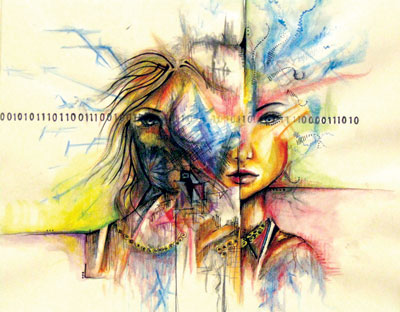All Nonfiction
- Bullying
- Books
- Academic
- Author Interviews
- Celebrity interviews
- College Articles
- College Essays
- Educator of the Year
- Heroes
- Interviews
- Memoir
- Personal Experience
- Sports
- Travel & Culture
All Opinions
- Bullying
- Current Events / Politics
- Discrimination
- Drugs / Alcohol / Smoking
- Entertainment / Celebrities
- Environment
- Love / Relationships
- Movies / Music / TV
- Pop Culture / Trends
- School / College
- Social Issues / Civics
- Spirituality / Religion
- Sports / Hobbies
All Hot Topics
- Bullying
- Community Service
- Environment
- Health
- Letters to the Editor
- Pride & Prejudice
- What Matters
- Back
Summer Guide
- Program Links
- Program Reviews
- Back
College Guide
- College Links
- College Reviews
- College Essays
- College Articles
- Back
Unknown
Everything is relative.
Think about it. Your ideas exist, basically, only inside your head. Everyone around you has their own individualistic approach to life, there is no overlap.
That should be mind-blowing and terrifying. The unknown naturally scares; it’s only human to fear that which you do not know. I hold the belief that practically every fear possessed by mankind is, at its core, a fear of the unknown. Therefore our very beings crave order and, consequently, division by difference.
Psychology Today supports my claim, suggesting that “categorization and bias come [very] easily...there is an unconscious desire to divide the world into ‘us’ and ‘them.’”. Unfortunately, this need for labels creates discrimination like racism and xenophobia, as seen in the racial profiling of Mexicans in the southern parts of North America and of any man or woman wearing traditional Muslim clothing.
I wish I could say I knew a way to get over our prejudice, but it seems to be innate. We are born into the world knowing nothing, and the way we learn is through our own experiences. We cannot possibly understand someone else’s journey, because each is unique. From this individualized path, we are unequivocally biased towards that which we understand. When we step out of our heads, the information and experiences of and from others flood over us enough that we crawl back into ourselves and form opinions. From those opinions emerge stereotypes, and “such stereotypes are reinforced so often that they can become ingrained.” (Psychology Today)
I grew up in a predominantly white Christian home. Everything around me since birth reflects our family’s morals; therefore they have been ingrained in me. The moment I stepped out of that bubble, around middle school, my mind began to revolt. Exposure to new ideas and new people expanded my knowledge and thoughts, and I changed as a person. This does not always happen. While I adapted with and embraced the newness of it all, some folks would recoil from the unfamiliar and high-tail it back to everything comfortable. The unknown fascinates me; I am willing to learn all that I can absorb. With an open mind, I can avoid creating stereotypes. Because of human nature, though, I will forever be influenced. I cannot easily change the way my brain functions in that, try as I might.
However, if everyone made a strong attempt to open their minds, stereotypes could become less abrasive. Cliché as it sounds, it does make loads of sense.
So I propose this: take a moment to investigate your own life for areas where you create an “us” and “them” separation. Don’t lie to yourself, there will always be at least one. Try to change, to open your mind to the differences. Even though this will not completely eliminate racism or xenophobia or judgments, it can start a degradation of hatred.

Similar Articles
JOIN THE DISCUSSION
This article has 0 comments.
